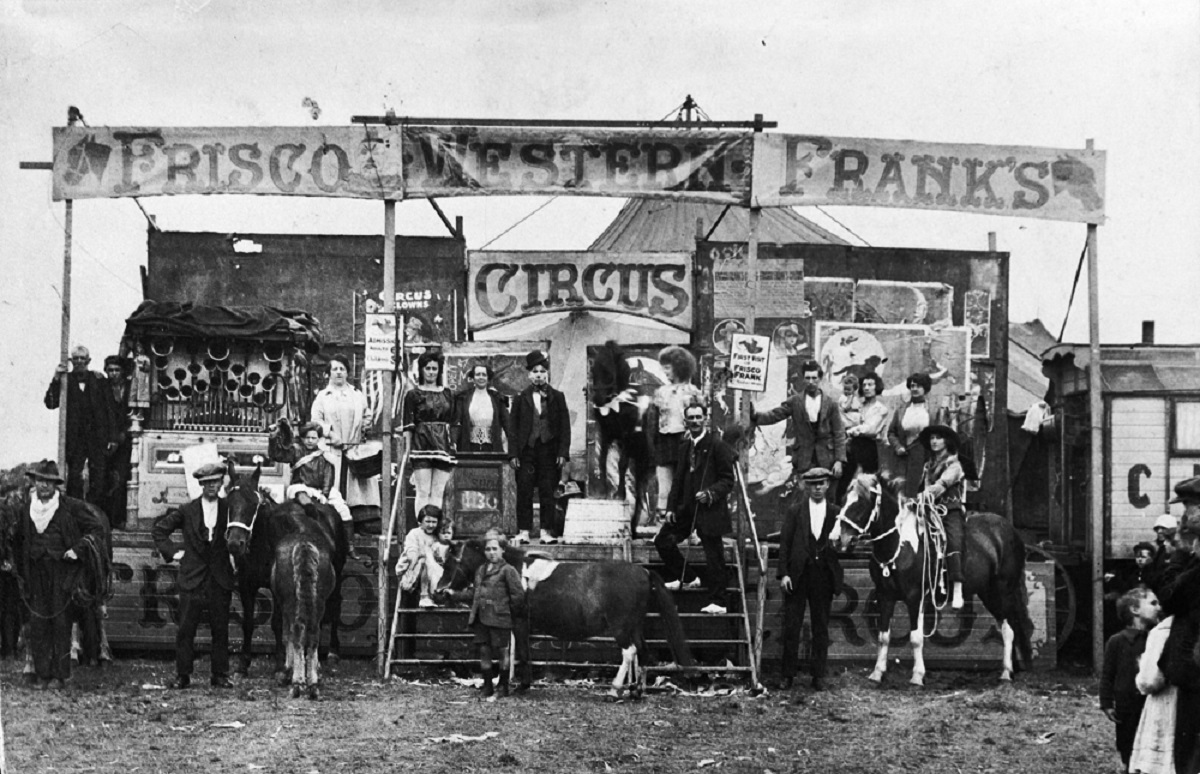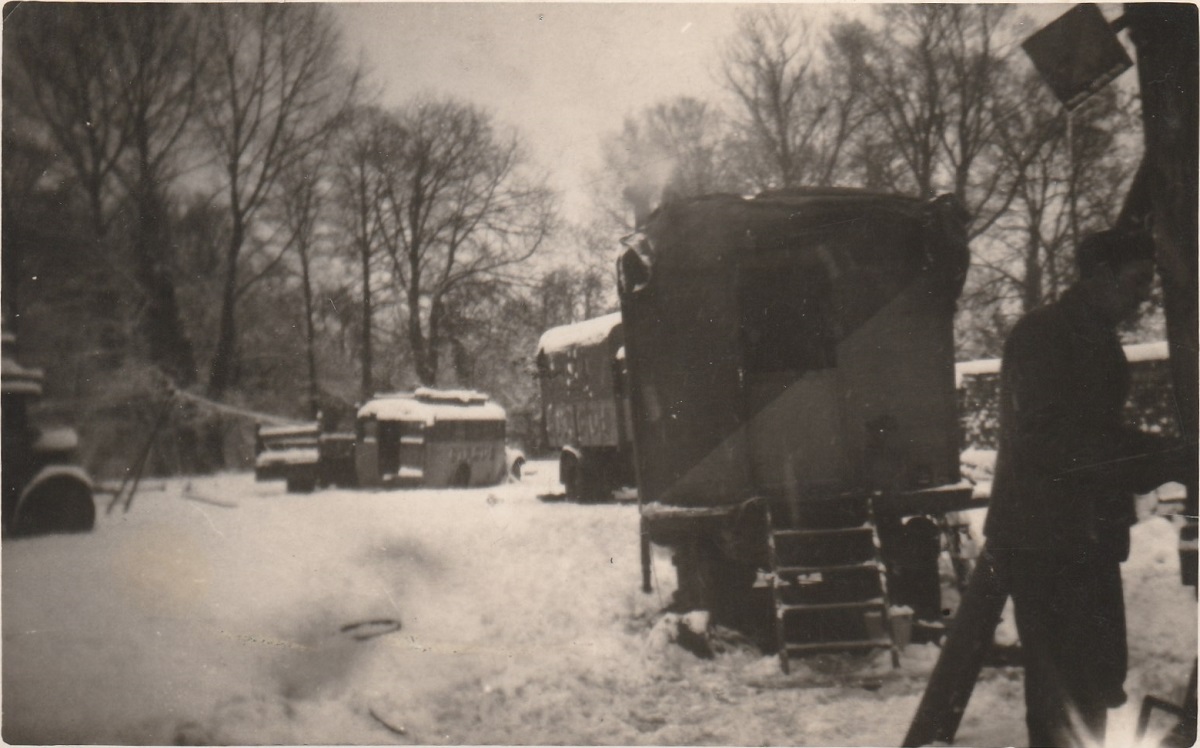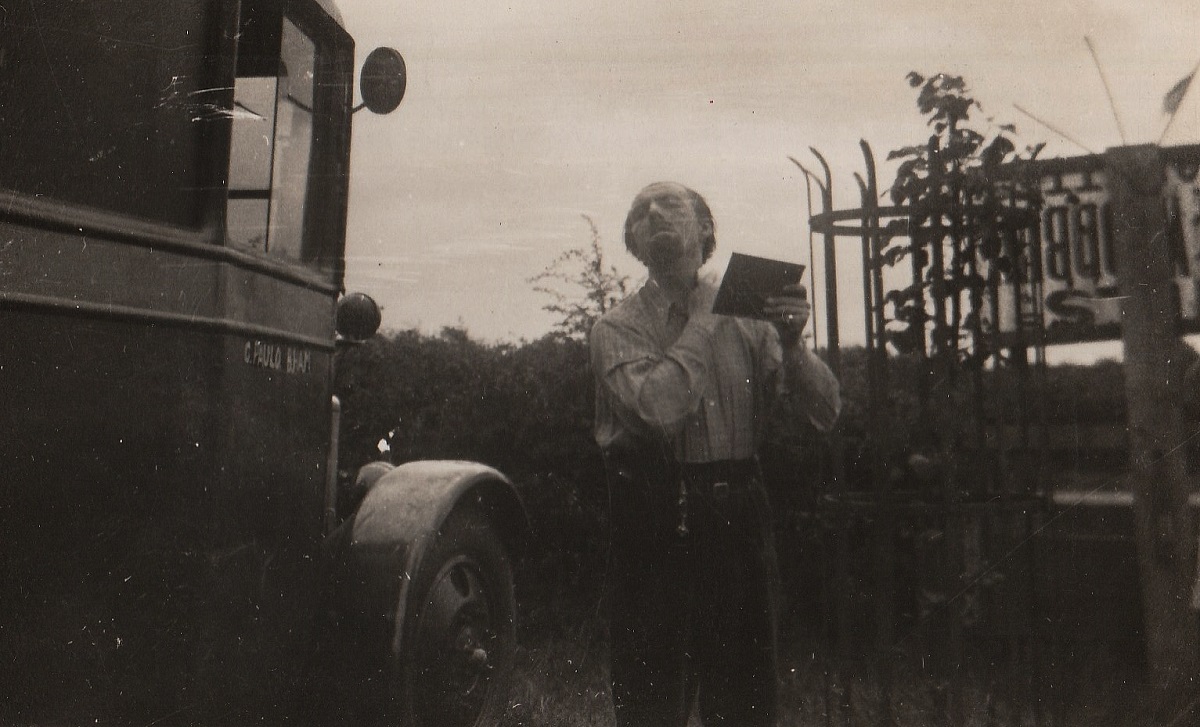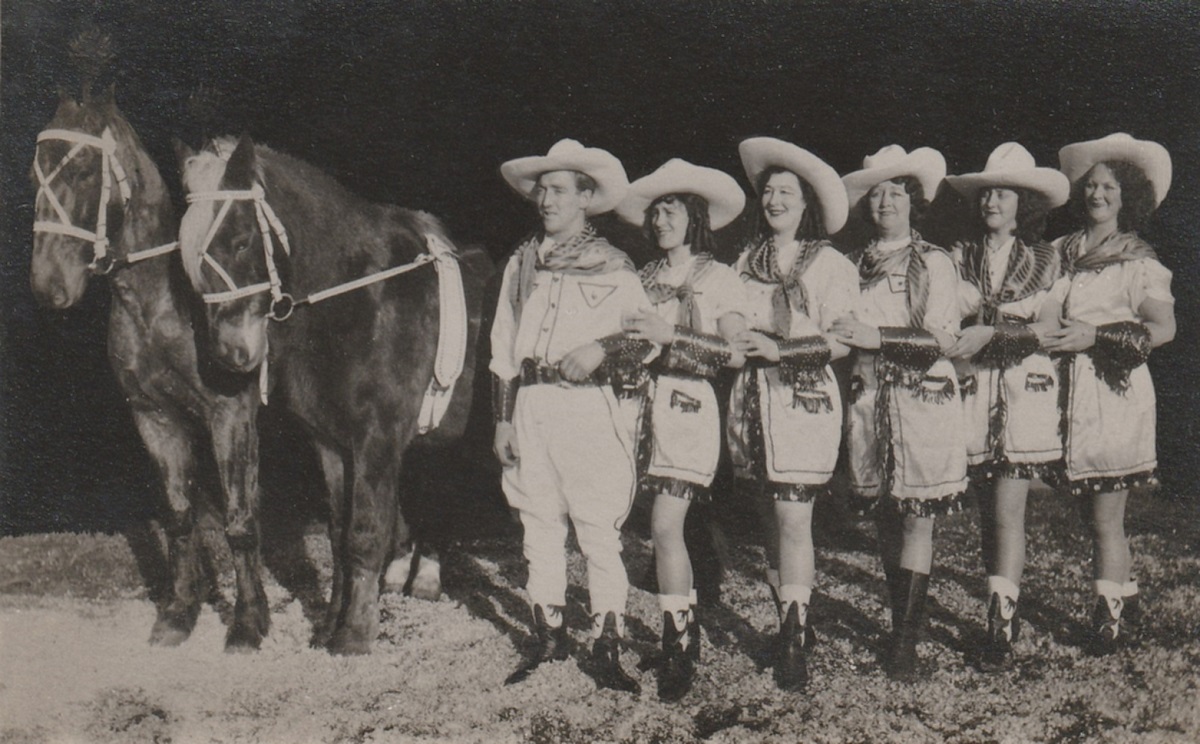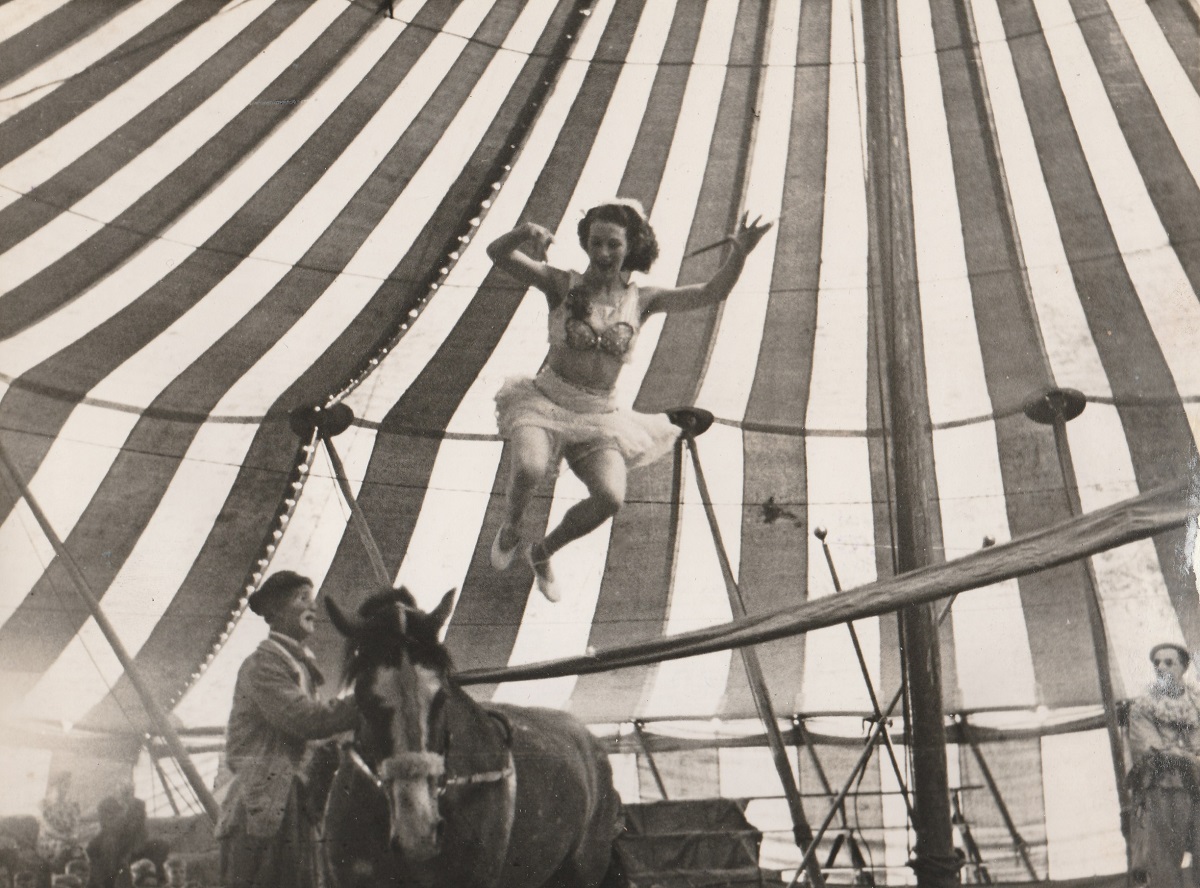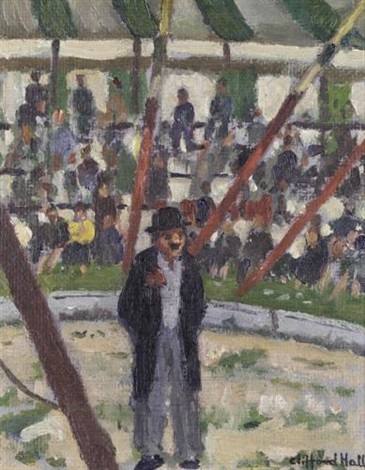


With Frisco Frank's Circus
Here the artists recalls a single day whilst travelling with the circus of Frisco Frank Paulo. Evidently written soon after the events occured, this may mark an early attempt at starting a journal as this account was found in a note book which has many pages missing but also contains two later entiries for the year of 1938. ( This short memoir is a previously unpublished work)
August 16, 1938
As we drove down the village street at about 8.30 in the morning the only person I noticed was an oldish man squatting by the side of the road. He was painting a picture of the Post Office.
The circus field turned out to be behind a not very prosperous looking garage. The field was small and strewn with tins and incredibly derelict cars. At the far end, in a corner, was pitched a little camping tent, patched and dirty. Soon our first lorry load arrived quickly followed by the others. Frank Paulo (billed as the 'Frisco Kid') was disappointed with the field and cursed the advance agent who had booked it. He explained that but for the fact that the agent was father of his mother-in-law they would have got rid of him long ago. This agent also had an expensive habit of sending unnecessary telegrams from far-off and out of the way places.
It was decided that there was not enough room for the two-pole tent, the absent agent was cursed again, and that the one-pole tent must be used. It commenced to rain. We all had to set to and move a number of battered cars to the edge of the field. They were utilized later however, for 'tying-off' and thus saved driving as many iron stakes as usual.
The build-up began and was almost finished when the man whom I had seen painting a picture of the Post Office walked into the field. He carried his picture and had his easel slung across his back. He wore a pair of stained dungaree trousers topped by a very old rubber mackintosh from which the rubber was decaying and showing the material underneath. He had on a pair of rope-soled canvas shoes such as one sees at the seaside. His long hair was almost white and fell about a face that was sunburned and grimed with dirt. He went across to the little camping tent in the corner of the field and I saw the hunchback for the first time. She crawled out of the tent to greet him and seemed no larger than a fair-sized dog. When she stood erect she was about four feet high with bobbed iron-grey hair, flat-chested, a huge hump between her narrow shoulders and legs thin like stalks. Her face had a beautiful expression but seemed to wear a gentle reproach for ordinary people. No one took any notice of her.
Later in the day I saw her with Popeye, the dog-faced baboon. This animal led a miserable life, continually teased by the children on the show and those who paid a penny to look at him. Twice a day he rode protesting round the ring chained to the back of a small pony. The audience could not see the chain and applauded loudly. On the yellow and red posters Popeye was described as 'the children's delight', and so he was in a way. Madame Paulo had bought him from some gypsies.
The hunchback and Popeye seemed like old friends. I overheard her making strange sounds to which the animal responded hoarsely putting its arms round her neck and searching diligently in her untidy hair.
I spoke to her that afternoon and she told me she composed music. 'He' was an actor and had worked with Nancy Price at the Playhouse. Things were bad in London and they had camped in the field all Summer. 'He' just managed to keep them in food with the few shillings obtained by painting pictures of the local pubs and careful studies of village shops with the shopkeeper's name flatteringly put in. No modern sketchy stuff would satisfy the villagers of Eye!
'Do you like camping in the open air?' she asked me, 'I do, it makes you hard. Of course it's cold at nights now there have been several frosts, but when he comes in it is soon warm and cozy.'
'He' was sitting silently outside the tent busily finishing his picture of the Post Office from memory. The Post Mistress had promised him the money that evening and he was anxious to get it done.
His picture was an oil about two foot by two foot and a half, painted on stout cartridge paper previously prepared with a coat of size and white. 'Canvas is so expensive' he explained.
It reminded me a little of Rousseau but it had a character of its own. There was a very personal feeling for light and it had for all its too insistent rendering of detail, window frames, doorknob and letter boxes, that indescribable thing we call quality. He painted each brick and was capable of introducing a few figures as well.
He had remarked my paint box and was anxious to see some of the sketches I had done on the show. I had one of the girls sitting for me before the afternoon performance began and I vaguely promised to show him the result. But although what I did turned out well I could not bring myself to let him see it. I felt that he would not like it and that in any case it would do him no good to see my work, whereas I could and had learned something from him there was nothing he could get from me.
He did not ask again. Alone, I looked at my pictures and suddenly regretted my hard-won accomplishment and sophistication in the face of those myriads of bricks and carefully drawn windows that yet held together pictorially in a way I could never make them do.
After the evening show we talked a little about painting and Turner. 'We are leaving here soon, I have about exhausted this place.' (The local pubs all had specimens of his work). 'And she likes to see the lights and the people of London in the Winter time.'
With the circus I left for Whittlesey at 6.30 the following morning.
Clifford Hall is known to have visited Paris, France less than a month after having writin this account.
Although he is known to have painted and drawn portraits of several members of the Paulo family and their clown called Zorro, we unfortunately don't presently have any images of these pictures, or any other of his circus related works which can definitely be identified as depicting his times traveling with Frisco Frank Paulo. Shortly after Clifford Hall died in December 1973, Emily Paulo sent a telegram to his widow expressing condolences on behalf of herself and the rest of the Paulo family.
The CIRCUS MEMOIRS, 1938
Originally billed as "Frisco Frank's Western Circus" Frank Paulo's circus began life in Ireland before the 1st World War. It appears to have originally been conceived as something of pastiche of Buffalo Bill's Wild West Show which had toured a number of times in Britain and elsewhere in Europe with great success between 1887 and 1906.
A large herd of horses and spectacular equestrian acts were a particular feature of Frank's circus. This photo was probably taken some of years before Clifford Hall tented with them.
A candid snap of the artist doing - what precisely? Possibly examining his neck in a hand mirror. He has simply written on the back: "With Paulo's Circus 1930s". (photo: from the artist's archives)
Another rather mysterious photograph which the artist just wrote "with the circus" on the back. It is clearly winter time and the snow is on the ground; the shadowy figure of the artist wearing what appears to be a beret on his head can just be seen on the right. It was possibly taken in the winter of 1937/38. (photo: from the artist's archives)
Publicity photo of an unidentified circus troupe of bareback riders (possibly led by the "Frisco Kid" himself) of the type which performed in Frisco Frank's circus and in other Paulo family circus shows for many years during the 20 century. (photo: from the artist's archives).
This photograph shows one of Frisco Frank's bareback riders (almost certainly Evelyn Paulo or her sister Clara) performing a highly difficult and dangerous equestrian circus act of the type that would almost certainly be deemed illegal in Britain today due to aniumal cruelty concerns, if nothing else - i.e. balancing on a moving horse's back in a standing position and skipping over a rope, or long band of cloth, while doing so. (photo: from the artist's archives)
This little paintiing of a dejected looking clown standing in a rough and ready circus ring by Clifford Hall is called "Billy Sanger's Circus" and is dated 1953. It appears to show a very similar sort of set up to the relatively smalll time travelling circus that was Frisco Frank's in the 1930s and 40s - apparently they continued to tour and perform round Britain throughout WW2.
